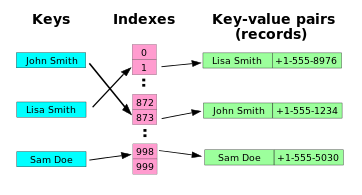C Program To Implement Dictionary Using Hashing Functions
Posted : adminOn 4/3/2018
The core idea behind hash tables is to use a hash function that maps a large keyspace to a smaller domain of array indices, and then use constant-time array operations to. A hash table is typically used to implement a dictionary data type, where keys are mapped to values, but unlike an array, the keys are not conveniently.
Mailformat: Formatting an e-mail message #!/bin/bash # mail-format.sh (ver. 1.1): Format e-mail messages. # Gets rid of carets, tabs, and also folds excessively long lines. # ================================================================= # Standard Check for Script Argument(s) ARGS=1 E_BADARGS=85 E_NOFILE=86 if [ $# -ne $ARGS ] # Correct number of arguments passed to script? Then echo 'Usage: `basename $0` filename' exit $E_BADARGS fi if [ -f '$1' ] # Check if file exists. Then file_name=$1 else echo 'File '$1 ' does not exist.'
Exit $E_NOFILE fi # ----------------------------------------------------------------- MAXWIDTH=70 # Width to fold excessively long lines to. # ================================= # A variable can hold a sed script. # It's a useful technique. Sedscript='s/^>// s/^ *>// s/^ *// s/ *//' # ================================= # Delete carets and tabs at beginning of lines, #+ then fold lines to $MAXWIDTH characters. Sed '$sedscript' $1 fold -s --width=$MAXWIDTH # -s option to 'fold' #+ breaks lines at whitespace, if possible. # This script was inspired by an article in a well-known trade journal #+ extolling a 164K MS Windows utility with similar functionality.
# # An nice set of text processing utilities and an efficient #+ scripting language provide an alternative to the bloated executables #+ of a clunky operating system. Rn: A simple-minded file renaming utility This script is a modification of. /bin/bash # rn.sh # Very simpleminded filename 'rename' utility (based on 'lowercase.sh'). # # The 'ren' utility, by Vladimir Lanin (lanin@csd2.nyu.edu), #+ does a much better job of this. ARGS=2 E_BADARGS=85 ONE=1 # For getting singular/plural right (see below). If [ $# -ne '$ARGS' ] then echo 'Usage: `basename $0` old-pattern new-pattern' # As in 'rn gif jpg', which renames all gif files in working directory to jpg. Exit $E_BADARGS fi number=0 # Keeps track of how many files actually renamed.
Bsa Cadet Serial Numbers there. For filename in *$1* #Traverse all matching files in directory. Do if [ -f '$filename' ] # If finds match. Then fname=`basename $filename` # Strip off path. N=`echo $fname sed -e 's/$1/$2/'` # Substitute new for old in filename. Mv $fname $n # Rename.
Let 'number += 1' fi done if [ '$number' -eq '$ONE' ] # For correct grammar. Then echo '$number file renamed.' Else echo '$number files renamed.' # Exercises: # --------- # What types of files will this not work on? # How can this be fixed?
Blank-rename: Renames filenames containing blanks This is an even simpler-minded version of previous script. /bin/bash # blank-rename.sh # # Substitutes underscores for blanks in all the filenames in a directory.
ONE=1 # For getting singular/plural right (see below). Number=0 # Keeps track of how many files actually renamed. FOUND=0 # Successful return value. For filename in * #Traverse all files in directory. Do echo '$filename' grep -q ' ' # Check whether filename if [ $? -eq $FOUND ] #+ contains space(s).
Then fname=$filename # Yes, this filename needs work. N=`echo $fname sed -e 's/ /_/g'` # Substitute underscore for blank. Mv '$fname' '$n' # Do the actual renaming. Let 'number += 1' fi done if [ '$number' -eq '$ONE' ] # For correct grammar. Then echo '$number file renamed.' Else echo '$number files renamed.'
Encryptedpw: Uploading to an ftp site, using a locally encrypted password #!/bin/bash # Example 'ex72.sh' modified to use encrypted password. # Note that this is still rather insecure, #+ since the decrypted password is sent in the clear. # Use something like 'ssh' if this is a concern. E_BADARGS=85 if [ -z '$1' ] then echo 'Usage: `basename $0` filename' exit $E_BADARGS fi Username=bozo # Change to suit.
Pword=/home/bozo/secret/password_encrypted.file # File containing encrypted password. Filename=`basename $1` # Strips pathname out of file name. Server='XXX' Directory='YYY' # Change above to actual server name & directory. Copy-cd: Copying a data CD #!/bin/bash # copy-cd.sh: copying a data CD CDROM=/dev/cdrom # CD ROM device OF=/home/bozo/projects/cdimage.iso # output file # /xxxx/xxxxxxxx/ Change to suit your system. BLOCKSIZE=2048 # SPEED=10 # If unspecified, uses max spd. # DEVICE=/dev/cdrom older version.
DEVICE='1,0,0' echo; echo 'Insert source CD, but do *not* mount it. Sony S Log2 Lut Download. ' Echo 'Press ENTER when ready.
' read ready # Wait for input, $ready not used. Microsoft Powerpoint 2003 Gratis Italiano Delite. Echo; echo 'Copying the source CD to $OF.' Echo 'This may take a while. Please be patient.' Dd if=$CDROM of=$OF bs=$BLOCKSIZE # Raw device copy.